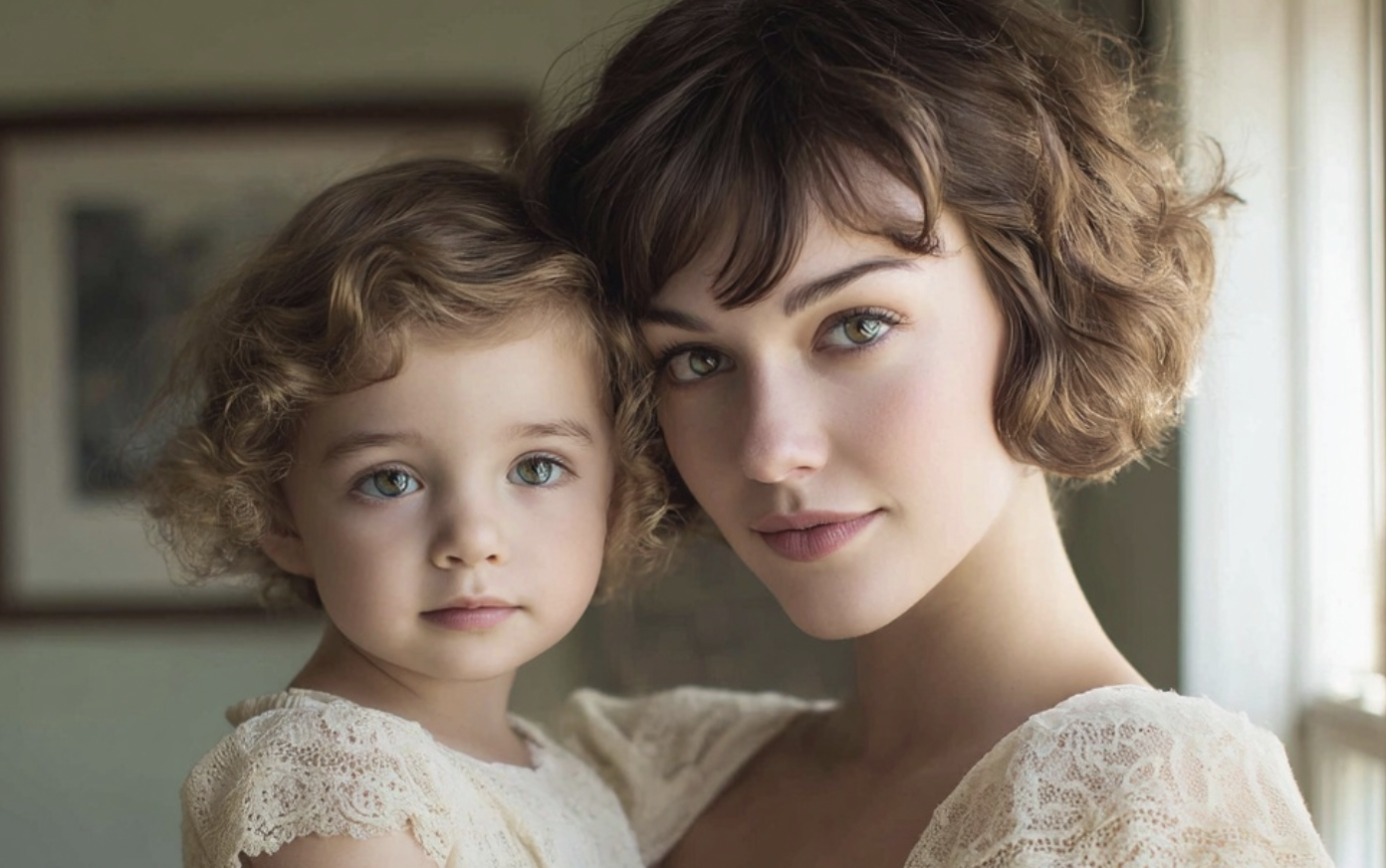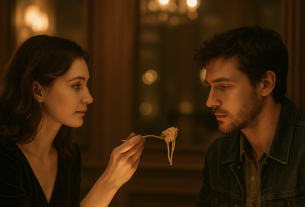Maxim clenched the ticket in his hand and looked at the familiar station. Three years away from home, three years of hard work at the logging camps—all for this moment. In his backpack were gifts for his mother and his sister Tatyana, and in his pocket—the cherished ring for Irina.
“Maxim? Is that really you?”
He turned and saw his neighbor Nikolai. The old man looked even older.
“Nikolai Petrovich!” Maxim grinned broadly. “How are things at home? I bet Mom’s already getting ready to welcome her prodigal son?”
Nikolai’s face grew serious; his eyes darkened.
“Boy… no one wrote to you?”
“About what?” A note of caution crept into Maxim’s voice.
“Your mother… two years ago her heart gave out. And Tatyana…” The old man sighed heavily. “She vanished completely. Left her daughter, locked her in alone in the winter, and ran off. The girl waited three days for her mother, until she broke a window. The neighbors heard her crying.”
Maxim felt the world tilt around him.
“Mother died?”
“Yes, we buried her in the local cemetery. And your sister…” Nikolai shook his head with contempt. “Her husband ran off, couldn’t stand her temper. She drank so hard even the local drunks avoided her. She just curdled like spoiled milk.”
For a minute Maxim stood in silence, trying to digest what he’d heard.
“Where’s Katya?”
“In an orphanage. There were no relatives left… we thought you’d disappeared off the face of the earth too.”
“And what about Tatyana? Where is she?”
“Who knows!” Nikolai waved his hand. “A month ago someone saw her near the station—dirty, bloated. Begging for alms. What a disgrace! Your mother must be turning in her grave because of such a daughter.”
The family home greeted Maxim with boarded-up windows and overgrown weeds. Nikolai and his wife, Zinaida, invited him in to tell him the full story of the tragedy.
“Your mother hoped for your return to the very end,” Zinaida said, setting a bowl of cabbage soup in front of him. “She kept saying, ‘My Maxim will come back and make everything right.’ And Tatyana…” The woman grimaced. “That snake knew only how to drink away your mother’s money.”
“We tried to help,” Nikolai added. “But she turned mean as a rabid dog, snapping at everyone. Swore like a sailor, even cursed at the neighbors’ kids.”
“And her husband, Viktor, endured and endured, then ran off to a mistress,” Zinaida went on. “He told everyone, ‘Living with a drunk is not life, it’s a slow death.’ And he was telling the truth.”
“What happened to Katya after you found her?” Maxim asked carefully.
“The girl sat alone for three days, crying,” Zinaida said, wiping her eyes. “When we pulled her out of that hell, she was like a frightened little animal. She kept asking, ‘When will Uncle Max come? He promised.’”
Maxim clenched his fists. Inside, everything burned with anger—at his sister and at himself.
“You know what, your Tatyana is just a monster in a skirt,” Nikolai couldn’t hold back. “What kind of mother abandons a child in winter? Even animals take better care of their young.”
The next day Maxim went into the city. He needed to buy a present for Katya and find out what was required to apply for guardianship.
In the toy store, a dark-haired salesgirl watched closely as Maxim chose a doll.
“For your daughter?” she asked gently.
“For my niece. For little Katyusha,” Maxim replied, and his voice immediately warmed. “She’s seven. She loves dolls with long hair you can braid. And she dreams of a dollhouse—the kind with tiny furniture and dishes.”
The salesgirl smiled.
“You talk about her so tenderly, as if she were your own daughter.”
“I love her very much,” Maxim admitted. “She’s the only family I have left. Such a clever girl—she could read at five, always drawing something. And her laugh is so infectious that even the grumpy neighbors smiled.”
“My name is Elena,” the girl introduced herself. “Good uncles are rarer than white crows these days.”
“Maxim,” he said, offering a handshake. “Is it strange to love your own niece?”
“These days many parents abandon their own children, and here an uncle is worrying,” Elena said sadly. “Men like you ought to be listed in the Red Book.”
At the orphanage, Katya first hid behind the caretaker, but when she recognized her uncle, she ran to him with a cry of joy.
“Uncle Max! You came! I knew you’d come back!” She hugged him tightly around the neck.
“Of course I did, my sunshine. How are you living here?”
“It’s not good here, Uncle Max,” the girl whispered. “The older girls take the sweets, and one boy fights. And it’s scary to sleep—they cry at night. Take me home, please.”
“I’ll definitely take you, my good girl. I just need to get the papers done.”
The director of the orphanage, a stout woman with cold eyes, shook her head.
“Guardianship won’t be granted to a single man. You need a stable job and a wife. Those are the legal requirements.”
“But I’m her blood uncle!” Maxim protested. “I have money, I can give my niece a decent life!”
“Money is fine, but we need certificates and documents,” the director replied icily. “Get official employment, marry a respectable woman, and then we’ll consider your application.”
“Respectable? Are you implying I’m not respectable?”
“A man without a steady job and without a family is not the best candidate for a guardian,” she cut him off. “The girl needs stability, not a romantic uncle with good intentions.”
On the bus home Maxim happened to spot a familiar face—the salesgirl Elena.
“Headed to our parts?” he asked, surprised.
“To my grandmother’s, in the neighboring village of Beryozovka,” she replied. “And how are things with your niece?”
Unexpectedly, Maxim told her the whole story. How he had gone off to earn money, built plans for the future, and returned to the ruins of his own life. Elena listened in silence, only occasionally shaking her head.
“My God, what cruelty,” she finally said. “The girl needs a family, and those bureaucrats only care about paperwork.”
“What should I do?” Maxim asked. “Katya is wasting away there, and I can’t do anything.”
“What about your fiancée? You mentioned a ring…”
“Oh, right—Irina,” Maxim said with a bitter smile. “I need to talk to her. Yes, talk, she’s waiting, and I haven’t even called.”
Irina was standing by the entrance with a baby carriage. When she saw Maxim, she turned pale.
“Max? You’re alive?”
“As you can see,” he nodded toward the stroller. “And you, I see, haven’t been bored either.”
“Maxim, forgive me,” Irina lowered her gaze. “I thought you wouldn’t come back. Everyone said men disappear without a trace in the logging camps, and I…”
“So you decided not to take the risk,” Maxim finished calmly. “I told you—three years, and I’d return.”
“But it’s been more than three years! And I had no word from you!”
“Because I was working like a damned man to earn money for our wedding, for a home.”
“It just… happened,” Irina couldn’t find an answer.
“And where is the child’s father?” Maxim nodded at the stroller.
“There is no father,” Irina said curtly.
Maxim looked for a long time at the woman he had considered the love of his life for three years.
“All right. Just live and don’t torture yourself with explanations.” He squeezed the ring box in his pocket. “I wish you happiness. Truly.”
“And what will you do?”
“I have Katya. That’s enough for happiness.”
The next day Maxim got a job as a loader at the local grocery store. The work was hard but steady. The manager warned him at once:
“We don’t do leniency here. I don’t tolerate lateness; show up drunk and you’re fired on the spot.”
“That suits me,” Maxim replied. “I need official employment to apply for guardianship.”
“A noble cause,” the manager approved. “I’ll respect you for your niece. Not many men like that left.”
A week later Maxim found Elena again in the same toy shop.
“I have a business proposal for you,” he began without preamble.
“I’m listening,” Elena set aside the price tags.
“Marry me.”
Elena’s eyes widened in surprise.
“I’m sorry, what?”
“A sham marriage. Six months at most,” Maxim hurried to explain. “I’ll pay you three hundred thousand rubles. As soon as I get guardianship of Katya, we’ll divorce right away. I swear I won’t so much as touch you.”
Elena slowly sat down.
“For the sake of guardianship over your niece?”
“Yes. I know it sounds crazy, but I have no other way. Katya is fading there, and those bureaucrats demand a wife.”
“And what about the girl? Will she learn the truth?”
“I’ll tell her as it is. Katya is a smart girl; she’ll understand. And besides…” Maxim faltered. “If you don’t mind, of course.”
Elena asked to be relieved and stepped outside. She was free, had long since broken up with her boyfriend, and the money—three hundred thousand for six months—doesn’t grow on trees.
“All right,” she agreed unexpectedly. “But we’ll draw up a contract. So everything is fair.”
“Of course,” Maxim nodded. “I’m not the kind of man who breaks promises.”
After two months of bureaucratic red tape, Katya finally crossed the threshold of her own home. Elena moved in with them to play the role of a family for the inspection commissions, but she lived in a separate room.
“Aunt Lena, what is a ‘sham marriage’?” Katya asked at breakfast.
“Where did you learn such complicated words?” Elena was surprised.
“Neighbor Aunt Galya told Dad, ‘Well, well, you’ve gone and started a sham marriage.’ I remembered.”
Maxim choked on his porridge.
“Aunt Galya reads too many tabloid papers,” Elena answered diplomatically. “And sham means when you pretend.”
“And are you pretending to love Dad?”
“Katya!” Maxim scolded his daughter.
“It’s all right,” Elena said gently. “You know, sweetheart, sometimes people start with make-believe and end with the truth. Life likes surprises like that.”
“Have you started loving Dad for real already?”
“Kateryna!” Maxim repeated, more sternly.
“Your dad is an interesting man,” Elena answered evasively. “And you’re a wonderful girl. How could anyone not love such a family?”
“Aunt Lena, are you really going to leave?” Katya asked every evening.
“A promise is a promise,” Elena would reply, but Maxim noticed the sadness in her eyes.
“What if I beg you very, very much to stay?”
“Sunshine, adults can’t always do what they want,” Elena explained. “We have a contract with your dad.”
“A stupid contract!” Katya protested. “I’d tear it up!”
“If only it were that simple,” Elena sighed.
“Aunt Lena, do you want to stay?”
Elena didn’t answer.
Six months flew by. On the day Elena was packing her things, Katya sobbed her heart out.
“I don’t want to! I won’t let Aunt Lena go!”
“Sweetheart, this is how we agreed,” Maxim explained gently, though his heart ached with longing.
“Dad Max, you’re a coward!” Katya burst out through tears. “A real coward!”
“Katya, don’t talk to your father like that,” Elena defended him.
“He’s not a father! A father wouldn’t let a mom go!” the girl gulped. “And he’s afraid to even say he loves her!”
Maxim stared at his daughter, at a loss for words.
“Katya, things aren’t that simple in the grown-up world,” Elena tried to explain. “Your dad is a decent man. He keeps his word.”
“I want him to be brave! And to tell you the truth!”
“What truth, sunshine?”
“That he loves you! That we all love you! That without you we’re miserable!”
Elena left to stay with her mother in another village. The house felt empty, as if its soul had been taken out.
“Dad Max, when will Aunt Lena come back?” Katya asked every day.
“I don’t know.”
“Do you love her?”
Maxim froze with a spoonful of porridge halfway to his mouth.
“Why do you ask?”
“Because you’re just as sad as I am,” the seven-year-old answered wisely. “And she was sad too. I saw her cry when she thought no one was looking.”
“You saw?”
“Uh-huh. And she ironed your shirts longer than anyone’s. And she always made your favorite cutlets. And she looked at you with special eyes.”
“What kind of special?”
“Like a princess looks at a prince in cartoons. Kind and shiny.”
Another two months passed. Every day Katya would conduct an interrogation:
“Dad Max, are you a coward?”
“Why would you think that?”
“Cowards are afraid to confess their love. That’s what they said in the cartoon.”
“Katya…”
“And cowards also make up silly reasons not to do what they want.”
“Those aren’t silly reasons. Those are principles.”
“Principles are when you do the right thing. And you’re doing the wrong thing! Aunt Lena is crying, you’re sad, and I’m miserable. What’s right about that?”
“But I gave my word…”
“A dumb word!” Katya stomped her foot. “Tomorrow you’re going to Aunt Lena. With flowers. And you’ll say you love her.”
“And if she refuses?”
“She won’t,” Katya declared confidently. “She loves you too. Women understand everything.”
“How do you know that?”
“I see it on TV. And Grandma said if a woman cooks borscht for a man for half a year, it means she loves him.”
“Borscht?”
“Well, yeah! Aunt Lena made you borscht. And strawberry compote too, even though she doesn’t like strawberries.”
The next day Maxim, with a bouquet of flowers, stood at the door of Elena’s mother’s house. Elena herself opened the door.
“Maxim? Is something wrong with Katya?”
“Katya is fine. She’s at home reading a book and waiting for good news.”
“What news?”
“Elena… I…” He held out the flowers. “Marry me.”
“But we’ve already divorced,” she said, bewildered.
“For real this time. If you’ll say yes.”
“Maxim, but our contract…”
“To hell with the contract,” he said suddenly, sharply. “Katya’s right. I’m a coward. I hid behind formalities for six months instead of admitting what mattered most.”
“Admitting what?”
“That I fell in love with you from the first day. That without you a house isn’t a home, just walls. That Katya is right—we’re all miserable without you.”
Elena was silent so long that Maxim was already preparing to leave.
“I thought you’d never dare,” she said quietly. “And I didn’t know how to say it first.”
“So… yes?”
“Of course yes, you fool. I’ve been waiting six months for you to realize that contracts can change when people change.”
“Change?”
“Did you think I agreed to play your wife just like that? From the first meeting I liked that stubborn man with the sad eyes and the wonderful niece.”
Katya met them at the house with a triumphant look.
“I told you so! Now I’ll have a mom and dad for real!”
“How did you know it would work out?” Maxim asked.
“Because I’m smart!” Katya said proudly. “And I also overheard Aunt Lena telling Grandma on the phone: ‘Mom, I’ve fallen in love with that clumsy bear. What should I do?’”
“You were eavesdropping?” Elena asked sternly.
“By accident! I was just standing by the door and listening. That’s not the same thing!”
“Of course it’s not the same thing,” Maxim laughed. “You’re turning into a diplomat.”
“What’s a diplomat?”
“A person who knows how to find a way out of difficult situations,” Elena explained.
“Then I’m definitely a diplomat! I got you two married!”
A year later, when Elena’s belly had rounded, Katya drew up a long list of names for the future little brother or sister.
“Listen to my options,” she announced solemnly. “If it’s a boy: Maxim the Second, Mighty Warrior, or Smartie. If it’s a girl: Elena the Second, Princess, or Beauty.”
“Princess?” Elena was surprised. “That’s not a name.”
“Why not? Then everyone will know what she’s like right away!”
“And what will they say at school?”
“They’ll say, ‘Here comes Princess!’ And they’ll be jealous!”
“Logical,” Maxim agreed. “Maybe we should pick something a bit more… traditional?”
“Dad, you promised I’d take part in choosing the name!”
“Take part, yes. But the final decision is still up to us.”
“Then I propose a compromise,” Katya said seriously. “An official normal name, and at home I’ll call her Princess or him Mighty Warrior. Deal?”
“Deal, our little diplomat,” Elena laughed.
Maxim and Elena only laughed as they looked over the pages filled with childish handwriting. A family that began as a sham arrangement had become the truest love they’d been searching for all their lives.
“You know what’s most amazing?” Elena said, sifting through Katya’s notes.
“What?”
“We wanted to fool the system, and ended up fooling ourselves. We thought we were playing roles, but in fact we were learning to be a family.”
“Good thing we have such a wise adviser,” Maxim nodded toward Katya, who was intently drawing a portrait of the future little brother or sister.
“Aunt Lena, you won’t leave anymore, will you?” the girl suddenly asked without looking up from her drawing.
“I’m not going anywhere, sunshine. I’m not Aunt Lena anymore. I’m Mom. And mothers don’t abandon their children.”
“And Dad won’t change his mind?”
“Your dad, it turns out, is very stubborn,” Elena smiled. “When he decides something, he doesn’t back down.”
“Is that good or bad?”
“In our case—very good,” Maxim said. “Because I’ve decided to love you for the rest of my life. And I won’t back down from that decision.”
Katya nodded contentedly and went back to her drawing. On the paper, a picture took shape: Dad, Mom, herself, and a tiny little person in a stroller. Above them the sun shone, and at the bottom, in big letters, it said: “Our Real Family.”



